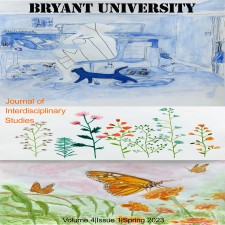Bryant University Undergraduate Journal
Abstract
According to the United States Department of Agriculture (USDA), “Agroforestry is the intentional integration of trees and shrubs into crop and animal farming systems to create environmental, economic, and social benefits. It has been practiced in the United States and around the world for centuries.” However, for many practitioners in the past, agroforestry was not simply an “integration of trees and shrubs into animal farming systems,” nor was it simply a means to produce foodstuffs. For them, agroforestry defined a way of life where trees were fixtures in the landscape which bore many life-giving gifts: fruits and nuts to eat, sap to drink, wood to stay warm, and shade to keep cool. Especially in temperate biomes, trees defined the relationships human cultures had with the land itself. The purpose of this paper is to offer a historical perspective on agroforestry by examining the land ethics of southeastern Native American and European cultures.
Course
HIS 490
First Faculty Advisor
Bryan Knapp
Recommended Citation
Bryant, Reed
(2023)
"A Historical Examination of Native American and European Agroforestry,"
Bryant University Undergraduate Journal: Vol. 4:
Iss.
1, Article 7.
Available at:
https://digitalcommons.bryant.edu/isbhs/vol4/iss1/7

Included in
Arts and Humanities Commons, Business Commons, Environmental Studies Commons, Science and Technology Studies Commons

